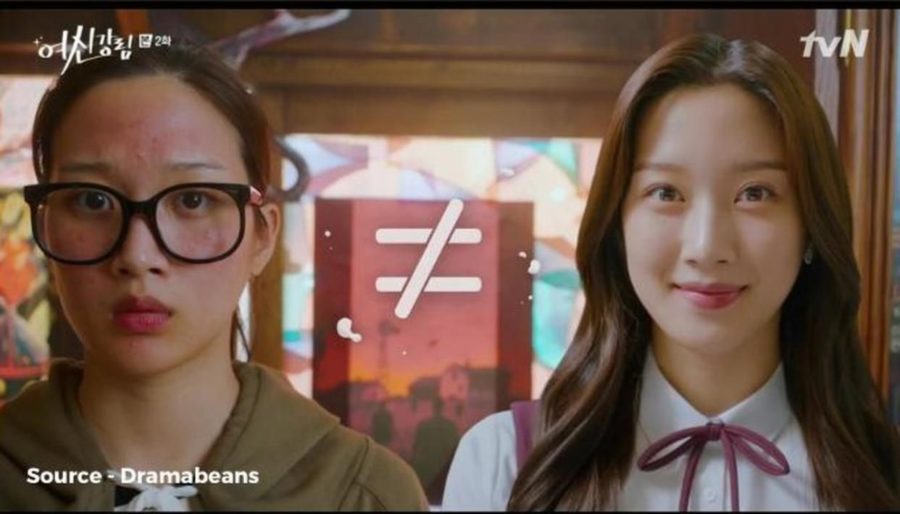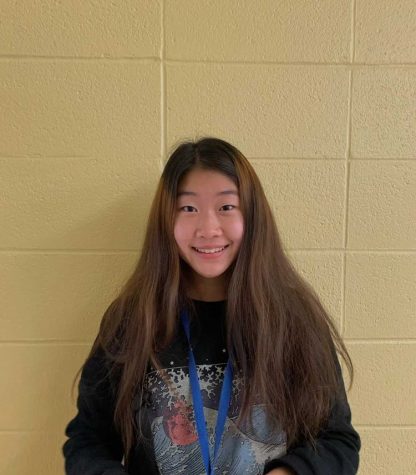True Beauty: Confronting Societal Beauty Standards with Self-Love
April 30, 2021
The popular Webtoon “True Beauty,” written by a Korean writer with the pen name of Yaongyi, was made into a Korean drama and released on December 9th, 2020. Since its release, the Kdrama has gained much attraction from the original Webtoon’s fan base, as well as many other audience members. The Kdrama has received great feedback and popularity, but beyond its surface level entertainment and drama, True Beauty’s brings the many struggles of today’s destructive beauty standards to light.
Im Ju-Kyung (Mun Ka-Young) is an average teenage girl struggling to find herself and her place in the world. Throughout her life, she’s dealt with the taunts of her classmates and the teases from her family members regarding her appearance. With glasses and acne, her character is portrayed as conventionally unattractive, leading her to have a inferiority complex regarding her appearance to the point of contemplating suicide. Throughout her life she’s experienced nothing less than hurtful commentary and judgement in regards to her appearance’s divergence from the standards of beauty, and throughout the course of the drama, audiences see the effects of such criticism as Ju-Kyung allows herself to perceive these remarks as her reality.
However, Ju-Kyung finally finds acceptance and even adoration among her peers once she transfers to a new school through the discovery of a long sought solution: makeup. With the aid of this physical beauty filter, Ju-Kyung is able to mask her insecurities while finding a new sense of self confidence within herself. She rebrands herself as her school’s beloved “goddess,” while also leading out her secret double-life as the bare-faced Ju-Kyung. Audiences follow along Ju-Kyung’s slow but sure discovery of self-love as she struggles to juggle both lives while maintaining her school self-image.
But through her management of both sides two extremes, Ju-Kyung experiences and relays the obvious realities of pretty privilege. After having endured her struggles as the “ugly girl,” Ju-Kyung recognizes an indisputable difference in treatment once she transforms into her “goddess state.” Upon her arrival at her new school, Ju-Kyung finds everything she’d once dreamed to have readily handed to her on a silver platter: attention, acceptance, friends. And as she continues to switch between both lives, audiences are able to see how drastic changes in appearance can completely change an individual’s treatment and experiences with others.
Coasting on the privileges of her new looks, Ju-Kyung finds herself at the center of her school’s attention. However, from her familiarity on both sides of the spectrum, Ju-Kyung is also given an eagle-eye’s view on the harsh realities of high school judgement. She sees herself mirrored in Han Go-Woon (Yeo Joo-ha), another “conventionally unattractive” individual with a goddess-like singing voice. Ju-Kyung takes Han Go-Woon under her wing with a newfound courage to stand against Go-Woon’s own bullies. But Ju-Kyung’s greatest take away comes from Go-Woon. Although Ju-Kyung also introduced Go-Woon to the wonders of makeup, Go-Woon refrains from allowing it to become her sole stronghold and identity. Instead, Go-Woon remains firmly confident in her bare face despite the judgement of her peers, lighting a spark of inspiration that is gradually kindled within Ju-Kyung until she herself can embrace her own bare face. Through protecting those like Han Go-Woon, she realizes that she wasn’t the problem; it was the insecurities of the other girls that led them to such violent and disgusting behavior.
Audiences are then carried along Ju-Kyung’s journey of self love and acceptance, despite all of the obstacles that stand in the way. But Ju-Kyung’s greatest obstacle turns out to be herself and her own mind. Rather than confronting her fears, she falls into an incessant routine relying on the mask of her makeup, fearing that the reveal of her bare face would destroy everything she’d finally built up in her new school. Although she finally found a sense of place among her peers, Ju-Kyung remained just as tied to her fears of rejection as before, tethered to the stronghold of her cosmetics. Through her two co-stars Su-ho (Cha Eun-woo) and Seo-joon (Hwang In-youp), popular and conventionally good-looking enemies, whom she’s caught in a love triangle with, she receives the love she had lacked for so many years. With their endearing acts, they fall in love with her awkwardly endearing personality, and compassionate heart. By the end, with their help, she was able love herself with and without her facade.
Of course, this message of self-love is just as relevant and important in each of our lives today as it was in Ju-Kyung’s journey of self-acceptance. Especially due to the pervasive influence of social media in our lives today, teenagers receive constant exposure to the world’s embodiments of beauty, perfected over social media’s rose-tinted lenses. Euro-centric beauty standards have made it increasingly difficult for many to view their own unique features as “beautiful,” especially as these standards pertain to only a small percentage of the world’s population. Views on self-worth, body-image, and individual beauty have become fixated on this idea of beauty that is in many cases unattainable, making comparison impossible to resist. As young girls strive to meet these standards today, they all experience similar struggles of how impossible they are to embody. With the pervasive epidemic of insecurities young girls face, we see how virtually unhealthy this lifestyle is becoming.
If we constantly subjected ourselves to conforming to every beauty standard, we wouldn’t be human. No one is perfect, and all these flaws and imperfections are what make you, you. The main message we get across from True Beauty is that there really is no “true beauty;” no matter what you do or try, you’ll never be satisfied by what the world says about you until you’re able to truly love yourself. True beauty only truly exists when we are able to experience the joy of audaciously staying true to ourselves, rather than putting up masks for the sake of others.


















































































































































